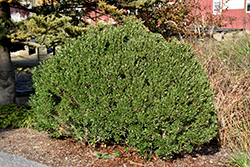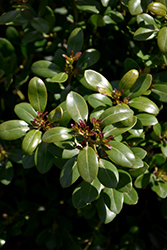Shamrock Inkberry Holly
Ilex glabra 'Shamrock'
Height: 4 feet
Spread: 4 feet
Sunlight:
![]()
![]()
Hardiness Zone: 5
Description:
A highly desirable and versatile evergreen landscape shrub, can be used in the garden or for hedging, massing and topiary, takes pruning very well; small glossy leaves and a naturally dense, compact oval form
Ornamental Features
Shamrock Inkberry Holly has dark green evergreen foliage which emerges light green in spring on a plant with an oval habit of growth. The glossy narrow leaves remain dark green throughout the winter.
Landscape Attributes
Shamrock Inkberry Holly is a dense multi-stemmed evergreen shrub with a shapely oval form. Its relatively fine texture sets it apart from other landscape plants with less refined foliage.
This shrub will require occasional maintenance and upkeep, and is best pruned in late winter once the threat of extreme cold has passed. Gardeners should be aware of the following characteristic(s) that may warrant special consideration;
- Suckering
Shamrock Inkberry Holly is recommended for the following landscape applications;
- Mass Planting
- Hedges/Screening
- General Garden Use
- Topiary
Planting & Growing
Shamrock Inkberry Holly will grow to be about 4 feet tall at maturity, with a spread of 4 feet. It tends to fill out right to the ground and therefore doesn't necessarily require facer plants in front. It grows at a slow rate, and under ideal conditions can be expected to live for 40 years or more.
This shrub does best in full sun to partial shade. It prefers to grow in moist to wet soil, and will even tolerate some standing water. It is very fussy about its soil conditions and must have rich, acidic soils to ensure success, and is subject to chlorosis (yellowing) of the foliage in alkaline soils. It is highly tolerant of urban pollution and will even thrive in inner city environments. Consider applying a thick mulch around the root zone in winter to protect it in exposed locations or colder microclimates. This is a selection of a native North American species.

